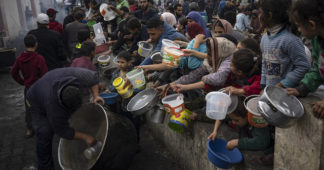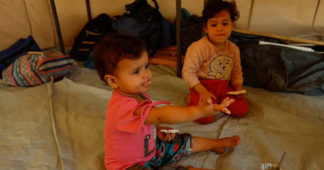Even in Yemen and Somalia, never has 100% of the population been food insecure like in Gaza.
Jan 9, 2024
According to The Telegraph, the UN has declared that food insecurity is now affecting the whole population of 2.3 million in Gaza, with half a million facing ‘catastrophic conditions’ which means people are experiencing “extreme food gaps and collapse of their livelihood”.
“Israel’s” use of starvation as a weapon of war has resulted in an alarming situation where the vast majority of people worldwide experiencing famine are located in Gaza, as indicated by a recent report by the UN-backed Integrated Food Security Phase Classification (IPC), Truthout highlighted.
Humanitarian workers in Gaza have reported that some are going up to 3 days without food.
Naouar Labidi, a senior officer with the World Food Programme (WFP), emphasized the “unique” character of the food security situation, calling it “unprecedented.”
Labidi noted that even in Yemen and Somalia, never has 100% of the population been food insecure like in Gaza.
Toddlers and newborns are particularly vulnerable since they rely heavily on food and nourishment to sustain their developing physical and mental abilities. Their growth may be hampered if they do not receive enough nourishment, resulting in irreparable physical and cognitive impairment known as ‘stunting’.
With over 135,000 in Gaza under the age of 2, doctors believe a whole generation is now in danger of developing the condition.
Anuradha Narayan, a senior nutrition adviser at Unicef warned that “The brain is such a big part of caloric and nutrient consumption in a child’s development,” meaning the consequences of stunting “are going to last a lifetime.”
Dr Nasser Bulbul, head of the Neonatal Intensive Care Unit at Shifa Hospital, told the Telegraph that cases of severe malnutrition were on the increase, emphasizing that with no nutrition the children “are turning into skeletons.”
We remind our readers that publication of articles on our site does not mean that we agree with what is written. Our policy is to publish anything which we consider of interest, so as to assist our readers in forming their opinions. Sometimes we even publish articles with which we totally disagree, since we believe it is important for our readers to be informed on as wide a spectrum of views as possible.











